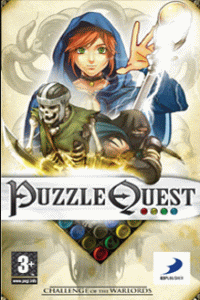Opinion: Puzzle Quest and the problem of App Store pricing
How the $9.99 puzzler is symptomatic of the pricing problems plaguing iPhone

When Puzzle Quest: Chapter 1 was released on the App Store two days before Christmas, it was an early present for puzzle fans. But every gift comes at a price - in this case, a cool $9.99 (£5.99).
It may not seem like much, but in a market dominated by cheap games, sticker shock is bound to cast a shadow over a game twice the price of its competitors. Acclaimed titles Rolando, Hero of Sparta, Brothers in Arms and Asphalt 4 all started at that point but dropped to $5.99 (£3.49) within a couple of months.
Puzzle Quest isn't the only game to get it wrong in Apple's commercially adventurous badlands, but it's handily symptomatic of the pricing issue that still hangs over the App Store.
At £5.99/$9.99, Puzzle Quest: Chapter 1 is the first of three instalments coming to iPhone. This touch-enabled version of the handheld hit comes a year and a half after the original Nintendo DS and PlayStation Portable iterations were launched in spring 2007 and almost a year after the mobile version of Puzzle Quest appeared last March.
The handheld editions can be purchased for about $15 in the US (although it tends to cost more in the UK). While this first chapter of Puzzle Quest on iPhone is less than that, two more chapters to be released later this year could make it a more expensive proposition at $30.
Transgaming, the developer responsible for the iPhone edition, deems the $9.99 price point to be appropriate. "We feel that $9.99 is a fair price for the quality and value a consumer is receiving with Puzzle Quest," says Paul Nowosad, VP of Marketing and Licensing.
The inclusion of the Revenge of the Plague Lord expansion pack justifies the price, he argues. "Furthermore, we're adding new features, functionality, and capabilities into the game either directly or indirectly as we deploy each Chapter."
However, other versions of Puzzle Quest that include the aforementioned expansion pack are available. Both Xbox Live and the PlayStation Network offer the game at 1500 MSP ($18.74) and $14.99, respectively.
The argument for pricing the game higher due to the inclusion of the expansion pack doesn't really hold. Even the downloadable PSP version on PlayStation Network clocks in at $14.99.
That puts the iPhone version on track to be more expensive, in which regard it would be conspicuously out of step with the rest of the App Store, where games are in many cases cheaper than their mobile phone counterparts.
Nowosad assures us that, "Chapters 2 and 3 will be priced lower than $9.99. We have referenced a 'downward pricing model' from day 1."
However, even if Transgaming halves the price of the two forthcoming chapters and releases them at $4.99, Puzzle Quest on iPhone will still cost more than the handheld versions.
Transgaming argues the price reflects the game's profile. "While many games in the same category may be priced lower, they are not as well-established as Puzzle Quest and they certainly don't deliver the same breadth, depth, and overall game quality."
It's a statement that makes sense intuitively - quality games tend to sell better in a conventional marketplace - but it doesn't hold up under the light of the game's poor performance on the App Store, initial technical stumbles, and the relative success of its more obscure competitors.
Puzzle Quest currently doesn't appear on the App Store Top 100; it isn't even listed among the top 100 games. In contrast, PopCap Games's Bejeweled 2 sits at number 9 on the list at $2.99. Trism, which carries the same $2.99 price point, has seen movement on the list too.
As Patryk Bukowiecki of Vivid Games observes, "We can't forget that the biggest and most expensive games are not necessarily at the very top of the best-selling games."
Vivid Games's own Samurai Puzzle Battle, a direct competitor to Puzzle Quest, carries a significantly lower $1.99 price point. Bukowiecki's game earned praise for quality, as did both Trism and Bejeweled 2.
Unfortunately, Transgaming's claims demonstrate a certain complacency about the robustness of the franchise in the new territory of the App Store. Our colleagues have reached the same conclusion.
Steve Palley of Slide to Play states in his cautious review, "This is a rotten port of a fantastic game."
Levi Buchanan of IGN Wireless asserts, "iPhone gamers being asked $10 for essentially a third of a Puzzle Quest game deserve better."
Nowosad insists that the decision to price this first instalment at $9.99 is fair. "While the prices for games may have been driven down as a result of both the tremendous number and the nature of the content on the App Store, Puzzle Quest is a well-established franchise that delivers exceptional gameplay and would be categorized in the top echelon of games that are available."
Bukowiecki disagrees. "We do believe that some puzzle games are way too expensive. We assure our fans and buyers of our games that they get high replayability and value for lower price."
Clearly, the notion of value isn't lost on those scouring the App Store for games. The response to Samurai Puzzle Battle, Trism, Bejeweled 2, and the scores of other puzzlers has been favourable because the price matches the perceived value of the game offered.
In the relatively untamed environment of the App Store publishers unwilling to adapt to the new model will continue to suffer.